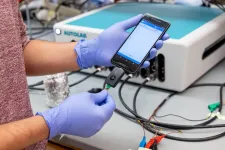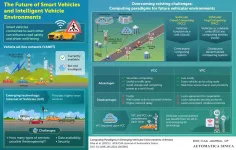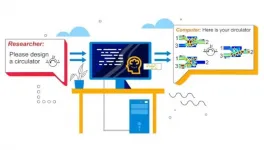Empathic and altruistic or cold and individualistic: our brains reveal the truth
The way the brain encodes information in social contexts enables us to distinguish between collaborative, caring personalities and those that are less empathic, a new study says
2021-05-12
(Press-News.org) Are you empathic, generous and altruistic? In short, do you possess that specific personality trait defined as agreeableness in the language of psychologists? New research from SISSA recently published in the journal NeuroImage sheds light on brain mechanisms underlying this trait.
The study showed that detached and individualistic subjects seem to process information associated with social and non-social contexts in similar ways, as demonstrated by similar activation patterns in the prefrontal cortex, whereas in more agreeable subjects the activation patterns arising from social and non-social situations show more differences. This suggests that individuals with high levels of agreeableness are able to discern social contents that are important, and particularly informative, for achieving successful interactions with others. This should not be surprising, since individual agreeableness is associated with characteristics, such as empathy, cooperation and generosity, which require the ability to recognise the cognitive, emotional and motivational aspects of others in social situations. These findings could contribute to future development of more objective and sensitive personality tests, including individuals' brain responses to stimuli varying in social content as a measure of agreeableness. The research was carried out by Dr. Sandra Arbula and Elisabetta Pisanu, and coordinated by Professor Raffaella I. Rumiati.
Visual tests and functional magnetic resonance imaging
"Personality traits reflect key aspects of variability among individuals. Understanding the mechanisms that give rise to these differences requires an in depth investigation of the behaviors associated with such traits, and their underlying neural sources" explain the scientists. The SISSA team recruited dozens of volunteers for their research according to their degree of agreeableness, one of the five major dimensions of personality, assessed with a questionnaire. "Participants were presented with short animations of different shapes that moved randomly or interacted in a socially meaningful way. Their brain activity was then recorded using functional magnetic resonance imaging, which enables detection of brain areas activated while they perform a given task, and has application in both research and clinical fields".
An important link between neural mechanisms and social behaviour
"Our results suggest something particularly interesting about agreeableness" explain Arbula and Rumiati. "We observed that representations of social information extracted form visual scenes are formed in the dorsomedial prefrontal cortex: based on their distinctiveness we are able to predict individual variations in agreeableness. The present finding reveals the link between neural and behavioral mechanisms underlying this specific personality trait" conclude Arbula and Rumiati. "Additionally, these sorts of connections provide new opportunities for the development of more objective personality measures".
INFORMATION:
[Attachments] See images for this press release:

ELSE PRESS RELEASES FROM THIS DATE:
2021-05-12
Peri-implantitis, a condition where tissue and bone around dental implants becomes infected, besets roughly one-quarter of dental implant patients, and currently there's no reliable way to assess how patients will respond to treatment of this condition.
To that end, a team led by the University of Michigan School of Dentistry developed a machine learning algorithm, a form of artificial intelligence, to assess an individual patient's risk of regenerative outcomes after surgical treatments of peri-implantitis.
The algorithm is called FARDEEP, which stands for Fast and Robust Deconvolution of Expression ...
2021-05-12
When Museums closed their doors in March 2020 for the first COVID-19 lockdown in the UK a majority moved their activities online to keep their audiences interested. Researchers from WMG, University of Warwick have worked with OUMNH, to analyse the success of the exhibitions, and say the way Museums operate will change forever.Caption: Compton Verney's homepage for the Cranach exhibition which opened in March 2020 Credit: Compton Verney
The cultural impact of the COVID-19 pandemic has been analysed by researchers from WMG, University of Warwick in collaboration with OUMNH (Oxford University Museum of Natural History) who in the paper, 'Digital Responses ...
2021-05-12
An international research team led by the University of Cologne has succeeded for the first time in connecting several atomically precise nanoribbons made of graphene, a modification of carbon, to form complex structures. The scientists have synthesized and spectroscopically characterized nanoribbon heterojunctions. They then were able to integrate the heterojunctions into an electronic component. In this way, they have created a novel sensor that is highly sensitive to atoms and molecules. The results of their research have been published under the title 'Tunneling current modulation in atomically precise graphene nanoribbon heterojunctions' in Nature Communications. The work was carried out in close cooperation between the Institute for ...
2021-05-12
BOSTON - (May 12, 2021) - Scientists are rapidly gathering evidence that variants of gut microbiomes, the collections of bacteria and other microbes in our digestive systems, may play harmful roles in diabetes and other diseases. Now Joslin Diabetes Center scientists have found dramatic differences between gut microbiomes from ancient North American peoples and modern microbiomes, offering new evidence on how these microbes may evolve with different diets.
The scientists analyzed microbial DNA found in indigenous human paleofeces (desiccated excrement) from unusually dry caves in Utah and northern Mexico with extremely ...
2021-05-12
Surface plasmon polaritons (SPPs) are highly localized surface waves on the interface between metal and dielectric in the optical frequency band. SSPs do not naturally exist in the microwave and terahertz frequencies, so "spoof" surface plasmon polaritons (SSPPs) are necessary for operations in those lower frequency bands.
Like optical SPPs, microwave SSPPs exhibit highly localized electromagnetic fields, subwavelength resolution, and extraordinary field confinement. Therefore, SSPP transmission lines (TLs) have been proposed as novel types of microwaveguides that offer new solutions for miniaturization, ...
2021-05-12
BOSTON - During the development and progression of Alzheimer's disease, a protein called tau accumulates and spreads in the brain. Understanding the mechanisms behind tau spread--and its consequences--may point to new prevention and treatment strategies for Alzheimer's disease and other forms of dementia. New insights now come from research that was led by investigators at Massachusetts General Hospital (MGH) and involves an anesthetic known to affect cognitive function. The findings are published in Communications Biology.
The scientists note that inflammation plays an important role in Alzheimer's disease, and microglia--immune cells that reside in the brain--are thought to be involved in this process by producing an ...
2021-05-12
Since the discovery of Alzheimer's disease over a century ago, two hallmarks of the devastating illness have taken center stage.
The first, known as amyloid plaques, are dense accumulations of misfolded amyloid protein, occurring in the spaces between nerve cells. Most efforts to halt the advance of Alzheimer's disease have targeted amyloid protein plaques. To date, all have met dispiriting failure.
The second classic trait has, until recently, received less scrutiny. It consists of string-like formations within the bodies of neurons, produced by another crucial protein-- tau. These are known as neurofibrillary tangles.
In a new study, researchers with the ASU-Banner Neurodegenerative Disease Center at the Biodesign ...
2021-05-12
PHILADELPHIA--A low-cost, rapid diagnostic test for COVID-19 developed by Penn Medicine provides COVID-19 results within four minutes with 90 percent accuracy. A paper published this week in Matter details the fast and inexpensive diagnostic test, called RAPID 1.0 (Real-time Accurate Portable Impedimetric Detection prototype 1.0). Compared to existing methods for COVID-19 detection, RAPID is inexpensive and highly scalable, allowing the production of millions of units per week.
Despite the urgency of the pandemic, most available methods for COVID-19 testing use RT-PCR--reverse transcription polymerase chain reaction--to detect ...
2021-05-12
Central to any technological progress is the enrichment of human life. The internet and wireless connectivity have done that by allowing not only virtually anyone anywhere to connect real time, but by making possible connections between humans and a range of intelligent devices both indoors and outdoors, putting smart cities on the horizon.
One key aspect of realizing smart cities is "smart vehicles", the latest development in intelligent transportation systems (ITS), which involve the integration of communication, mapping, positioning, network, and sensor technologies to ensure cooperative, efficient, intelligent, safe, and economical transportation.
For decades, research on bringing to the streets smart vehicles that operate ...
2021-05-12
The field of magnonics offers a new type of low-power information processing, in which magnons, the quanta of spin waves, carry and process data instead of electrons. The end goal of this field is to create magnonic circuits, which would be smaller and more energy-efficient than current electronic ones.
Until recently, the development of a functional magnonic device could take years of trial-and-error. Researchers from the University of Vienna and the TU Kaiserslautern have developed a new computational method to design new devices in a considerably shorter time. Moreover, the efficiency added through this novel inverse design method helps overcome a traditional problem with such devices: they were just suitable for one function only. Now, thanks to the proposed ...
LAST 30 PRESS RELEASES:
[Press-News.org] Empathic and altruistic or cold and individualistic: our brains reveal the truth
The way the brain encodes information in social contexts enables us to distinguish between collaborative, caring personalities and those that are less empathic, a new study says






